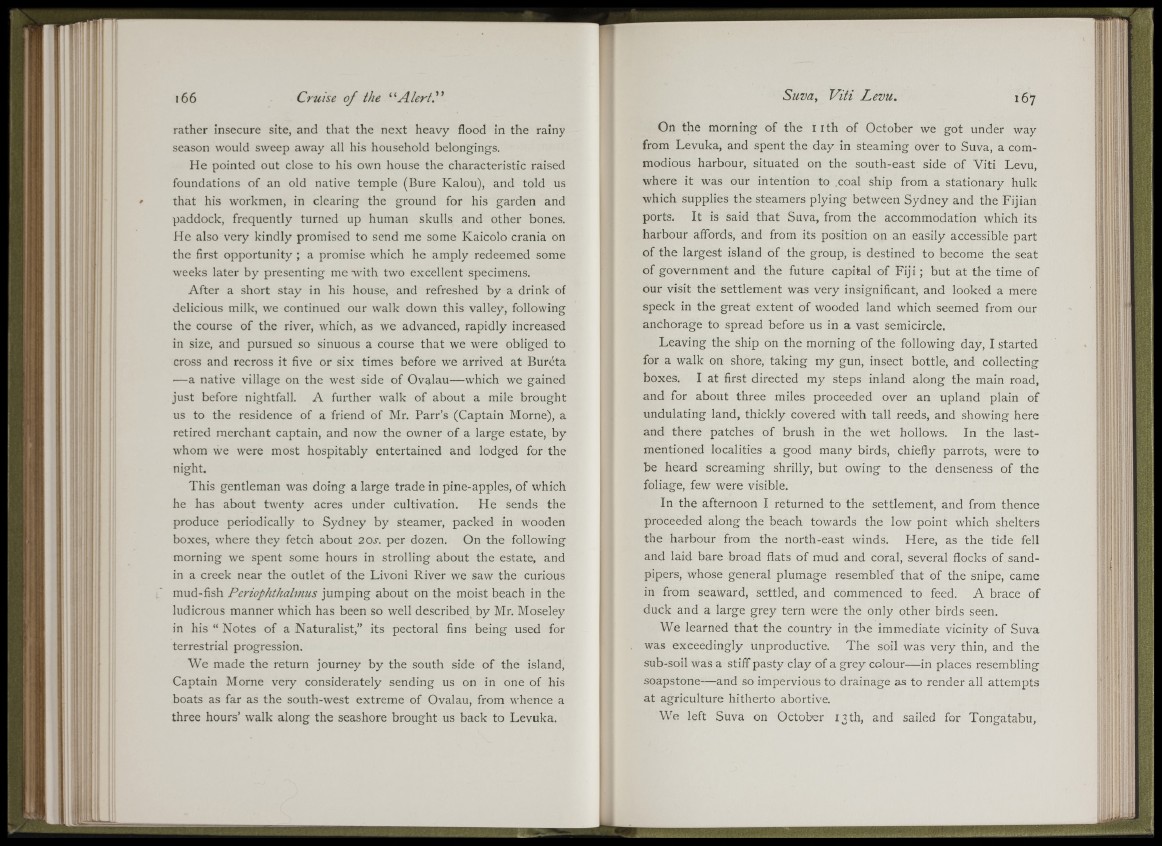
I”
III ill ili-,
11"
iiii « Ili
li ,
!'ì .
| i l l i i i i
ili «II'! ■
111;; :i
81 ■ ,
s- ■ ■'
;!L, ■ .1i
;:ki. 11
ir,
- !
j ■ ' i
I i
li
, r n ■
'LI
! i
l!
'■ |!l
rather insecure site, and that the next heavy flood in the rainy
season would sweep away all his household belongings.
He pointed out close to his own house the characteristic raised
foundations of an old native temple (Bure Kalou), and told us
that his workmen, in clearing the ground for his garden and
paddock, frequently turned up human skulls and other bones.
He also very kindly promised to send me some Kaicolo crania on
the first opportunity ; a promise which he amply redeemed some
weeks later by presenting me with two excellent specimens.
After a short stay in his house, and refreshed by a drink of
delicious milk, we continued our walk down this valley, following
the course of the river, which, as we advanced, rapidly increased
in size, and pursued so sinuous a course that we were obliged to
cross and recross it five or six times before we arrived at Bureta
•— a native village on the west side of Ovalau— which we gained
just before nightfall. A further walk of about a mile brought
us to the residence of a friend of Mr. Parr’s (Captain Morne), a
retired merchant captain, and now the owner of a large estate, by
whom we were most hospitably entertained and lodged for the
night.
This gentleman was doing a large trade in pine-apples, of which
he has about twenty acres under cultivation. He sends the
produce periodically to Sydney by steamer, packed in wooden
boxes, where they fetch about 20s. per dozen. On the following
morning we spent some hours in strolling about the estate, and
in a creek near the outlet of the Livoni River we saw the curious
mud-fish Periophthalmus jumping about on the moist beach in the
ludicrous manner which has been so well described by Mr. Moseley
in his “ Notes of a Naturalist,” its pectoral fins being used for
terrestrial progression.
We made the return journey by the south side of the island,
Captain Morne very considerately sending us on in one of his
boats as far as the south-west extreme of Ovalau, from whence a
three hours’ walk along the seashore brought us back to Levuka.
On the morning of the 11 th of October we got under way
from Levuka, and spent the day in steaming over to Suva, a commodious
harbour, situated on the south-east side of Viti Levu,
where it was our intention to coal ship from a stationary hulk
which supplies the steamers plying between Sydney and the Fijian
ports. It is said that Suva, from the accommodation which its
harbour affords, and from its position on an easily accessible part
of the largest island of the group, is destined to become the seat
of government and the future capital of F i j i ; but at the time of
our visit the settlement was very insignificant, and looked a mere
speck in the great extent of wooded land which seemed from our
anchorage to spread before us in a vast semicircle.
Leaving the ship on the morning of the following day, I started
for a walk on shore, taking my gun, insect bottle, and collecting
boxes. I at first directed my steps inland along the main road,
and for about three miles proceeded over an upland plain of
undulating land, thickly covered with tall reeds, and showing here
and there patches of brush in the wet hollows. In the last-
mentioned localities a good many birds, chiefly parrots, were to
be heard screaming shrilly, but owing to the denseness of the
foliage, few were visible.
In the afternoon I returned to the settlement, and from thence
proceeded along the beach towards the low point which shelters
the harbour from the north-east winds. Here, as the tide fell
and laid bare broad flats of mud and coral, several flocks of sandpipers,
whose general plumage resembled’ that of the snipe, came
in from seaward, settled, and commenced to feed. A brace of
duck and a large grey tern were the only other birds seen.
We learned that the country in the immediate vicinity of Suva
was exceedingly unproductive. The soil was very thin, and the
sub-soil was a stiff pasty clay of a grey colour— in places resembling
soapstone— and so impervious to drainage as to render all attempts
at agriculture hitlierto abortive.
We left Suva on October 13th, and sailed for Tongatabu,
z m
..-I
IH3i|
I